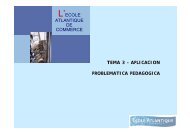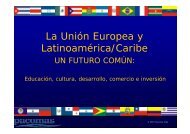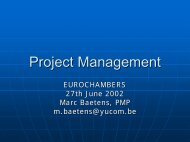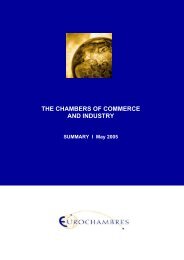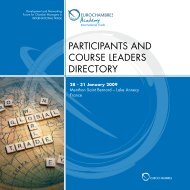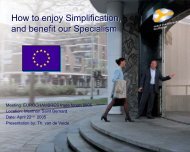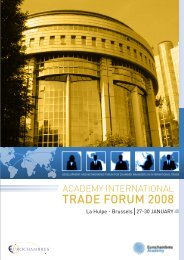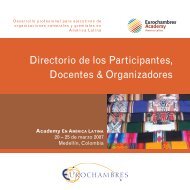O.14 Inversion extranjera directa - Eurochambres Academy
O.14 Inversion extranjera directa - Eurochambres Academy
O.14 Inversion extranjera directa - Eurochambres Academy
You also want an ePaper? Increase the reach of your titles
YUMPU automatically turns print PDFs into web optimized ePapers that Google loves.
Inversión Extranjera Directa:<br />
Cómo ofrecer servicios<br />
Florianópolis, Brasil. 28 de Abril, 2012<br />
Jesús Used. Director.
Interacción económica 2
Globalización<br />
3<br />
• Proceso de integración de las<br />
distintas economías nacionales<br />
en una economía de mercado<br />
mundial.<br />
• Proceso autónomo y de orden<br />
espontáneo favorecido hoy por:<br />
–crecimiento económico<br />
–avance tecnológico<br />
–conectividad humana<br />
• transporte<br />
•comunicaciones
Gobalización: ¿es esto
Definiendo la Internacionalización<br />
La internacionalización es la respuesta de cada empresa u<br />
organización a la globalización.<br />
La respuesta no es universal, cada empresa responderá del modo<br />
más adecuado a su esencia y circunstancias.<br />
La PYME no tiene los mismos recursos para la respuesta que la<br />
gran empresa.
Definiendo la Internacionalización<br />
• Internacionalización<br />
–Posicionamiento de la empresa en relación a la<br />
Globalización de los consumidores, del mercado de<br />
productos y servicios, tanto finales como<br />
intermedios, y de recursos de generación de valor<br />
añadido.
Modelo de proceso de Internacionalización<br />
Iniciación<br />
Acceso<br />
a<br />
Mercados<br />
Otra<br />
participación<br />
en mercados<br />
(FDI)<br />
Planificación<br />
Operaciones comerciales<br />
Internacionalización<br />
Las empresas, cada día más internacionalizadas, superan antes, y con<br />
mayor frecuencia, las primeras etapas de la internacionalización:
Modelo de proceso de Internacionalización<br />
Iniciación<br />
Acceso<br />
a<br />
Mercados<br />
Otra<br />
participación<br />
en mercados<br />
(FDI)<br />
Planificación<br />
Exportación reactiva y<br />
ocasional<br />
Exportación proactiva<br />
Operaciones comerciales<br />
Internacionalización<br />
Exportación regular<br />
Acopios en el exterior<br />
PROCESOS DE FDI<br />
•Apertura de oficinas de<br />
representación comercial (filiales de<br />
venta)<br />
•Producción en el exterior<br />
•Ubicación de procesos de VA
FDI in the world<br />
OECD Defintion of Foreign direct investment<br />
Foreign direct investment reflects the objective of obtaining a lasting interest by a resident entity in one<br />
economy (‘‘direct investor’’) in an entity resident in an economy other than that of the investor (‘‘direct<br />
investment enterprise’’). The lasting interest implies the existence of a long-term relationship between the<br />
direct investor and the enterprise and a significant degree of influence on the management of the enterprise.<br />
Direct investment involves both the initial transaction between the two entities and all subsequent capital<br />
transactions between them and among affiliated enterprises, bothincorporated and unincorporated.<br />
(…..)<br />
OECD recommends that a direct investment enterprise be defined as an incorporated or unincorporated<br />
enterprise in which a foreign investor owns 10 per cent or more of the ordinary shares or voting power of an<br />
incorporated enterprise or the equivalent of an unincorporated enterprise.<br />
De: DÉFINITION DE RÉFÉRENCE DE L’OCDE DES INVESTISSEMENTS DIRECTS INTERNATIONAUX
FDI in the world<br />
Inward and outward foreign direct investment stock, annual, 1980-2010<br />
Source. UNCTAD, UNCTADstat<br />
US Dollars at current prices and current exchange rates in millions<br />
MEASURE<br />
YEAR<br />
Outward Stock<br />
2010<br />
Inward Stock<br />
2010<br />
World 20.408.256,51 100,00% 19.140.603,01 100,00%<br />
Developing economies 3.131.844,65 15,35% 5.951.202,73 31,09%<br />
Transition economies 472.876,09 2,32% 687.831,71 3,59%<br />
Developed economies 16.803.535,77 82,34% 12.501.568,58 65,31%<br />
ECONOMY<br />
Developing economies 3.131.844,65 100,00% 100,00% 5.951.202,73 100,00% 100,00%<br />
Developing economies: Africa 122.428,67 3,91% 100,00% 553.972,11 9,31% 100,00%<br />
Eastern Africa 4.682,98 3,83% 48.152,07 8,69%<br />
Middle Africa 5.696,24 4,65% 63.342,73 11,43%<br />
Northern Africa 23.561,88 19,25% 206.066,74 37,20%<br />
Southern Africa 81.694,14 66,73% 141.015,04 25,46%<br />
Western Africa 6.793,43 5,55% 95.395,53 17,22%<br />
Developing economies: America 732.780,98 23,40% 23,40% 100,00% 1.722.277,78 28,94% 28,94% 100,00%<br />
Caribbean 326.709,64 44,58% 415.074,44 24,10%<br />
Central America 98.576,01 13,45% 407.662,29 23,67%<br />
South America 307.495,33 41,96% 899.541,05 52,23%<br />
Developing economies: Asia 2.276.193,82 72,68% 72,68% 100,00% 3.662.985,44 61,55% 61,55% 100,00%<br />
Eastern Asia 1.586.467,69 69,70% 1.888.390,36 51,55%<br />
Southern Asia 97.168,23 4,27% 260.980,24 7,12%<br />
South-Eastern Asia 431.529,00 18,96% 938.401,34 25,62%<br />
Western Asia 161.028,91 7,07% 575.213,50 15,70%<br />
Developing economies: Oceania 441,17 0,01% 0,01% 100,00% 11.967,39 0,20% 0,20% 100,00%
Motivos para la IED
Las empresas invierten…<br />
y los gobiernos quieren que inviertan<br />
• Los gobiernos tiene un interés creciente en la<br />
atracción de FDI:<br />
– como fuente de financiación<br />
– como potenciador del empleo y de su<br />
capacitación<br />
– crecimiento económico<br />
– y de la captación de tecnología. La tecnología que<br />
entra en un país, se "filtra" y se asienta en el<br />
territorio.
IPAs in Latin America
Centralización o descentralización:<br />
Debate
Decisión del destino de Inversión<br />
• list of potential host countries (typically<br />
includes 8 to 20 countries) belonging to three<br />
groups:<br />
– (i) most popular FDI destinations in the world,<br />
– (ii) countries close to the existing operations of<br />
the investor, and<br />
– (iii) emerging FDI destinations (that is, countries<br />
that the investor may not be initially very serious<br />
about but which represent “out of the box”<br />
thinking). The inclusion of the third category<br />
presents an opportunity for IPAs.<br />
Estudio the WORLD BANK. Development Research Group, Trade Team. Agosto 2007 (Policy Research Working Paper 4339):
Decisión del destino de Inversión<br />
• trade-off between costs and the quality of<br />
business environment:<br />
• No visiting the site. Based on information<br />
available accessibility of the information<br />
about the business conditions in a host<br />
country plays a crucial role. IPA has to be<br />
there on the net and available for Q&A<br />
• Short list of +- 5 countries<br />
Estudio the WORLD BANK. Development Research Group, Trade Team. Agosto 2007 (Policy Research Working Paper 4339):
Decisión del destino de Inversión<br />
• Visiting the countries in the short list.<br />
– Done by the potential investor, consultants or<br />
both.<br />
– Interaction with IPA is crucial.<br />
Estudio the WORLD BANK. Development Research Group, Trade Team. Agosto 2007 (Policy Research Working Paper 4339):
Decisión del destino de Inversión<br />
• Final stage: Decission<br />
– based on the availability of potential sites, costs,<br />
the overall quality of business climate and<br />
availability of incentives<br />
– An IPA can assist in providing information on<br />
incentives and offering help with the registration<br />
process<br />
As evident from the above outline, IPAs can play a significant role in the selection process of FDI<br />
sites. The national IPA is often the first entity which a potential investor contacts to obtain<br />
information. Absence of an IPA not only increases the investor’s cost of gathering information<br />
but also sends a negative signal suggesting that the country is not interested in attracting FDI. It<br />
may constitute a reason to eliminate a location during the selection process.<br />
Estudio the WORLD BANK. Development Research Group, Trade Team. Agosto 2007 (Policy Research Working Paper 4339):
Tienen éxito las IPAs<br />
• El estudio concluye que las IPAs tienen un efecto positivo<br />
en la inversión, mayor si es en países en desarrollo y<br />
mayor si hay una orientación-segmentación sectorial.<br />
• Afirma y concluye también que las agencias público<br />
privadas (o quasi públicas, como las llaman ) son mas<br />
efectivas que aquellas que son subunidades de<br />
ministerios.<br />
• Otros estudios añaden la influencia que el clima de<br />
negocios y el tamaño y grado de desarrollo de la<br />
economía tienen en la atracción de inversiones.<br />
Estudio the WORLD BANK. Development Research Group, Trade Team. Agosto 2007 (Policy Research Working Paper 4339):
PROCESO<br />
de la voluntad al EXITO
• Voluntad política<br />
• Identificación de sectores estratégicos<br />
• Inteligencia<br />
• Acción.<br />
• Promoción<br />
– Valores reales<br />
– Valores diferenciales.<br />
• Paquete de beneficios<br />
• BALANCE valores/intereses/beneficios<br />
OFERTA<br />
Y<br />
NEGOCIACION<br />
APOYO A LA<br />
EJECUCION<br />
VENTA • Red de contactos locales<br />
• Barreras idiomáticas y culturales<br />
• Legal: mercantil, fiscal, laboral<br />
• Selección de personal<br />
• Formación<br />
• Permisos actividad, licencias,<br />
homologaciones, etc<br />
• Importación Bienes de Inversión<br />
• Logística<br />
• Expatriación: Permisos, Visados,<br />
Vivienda, Educación, Integración…
LA ORGANIZACIÓN NECESARIA
El inversor y nuestra respuesta
Los mandamientos<br />
• Orientarémi organización al cliente<br />
• Me adelantaréa las necesidades del inversor<br />
• Le anticiparélos problemas que aún no conoce<br />
• No marearéal cliente<br />
• Resolveréel problema de mi cliente<br />
• Pondréun interlocutor único para el inversor<br />
Estos mandamientos se resumen en:<br />
Mi trabajo tiene sentido porque mi cliente tiene<br />
dificultades que superar
El perfil del lead manager<br />
• Buena interlocución interna y externa<br />
• Visión global<br />
• Autoridad<br />
• Buen conocedor de los servicios<br />
• Conseguidor<br />
• Fixer
Gracias por su atención<br />
Jesús Used<br />
Jused@ubglobally.com




